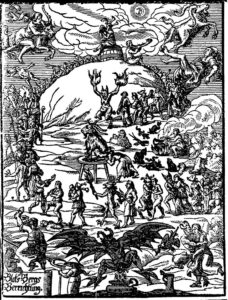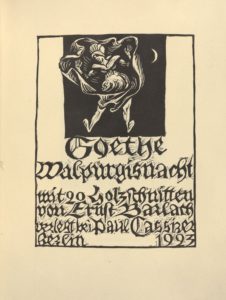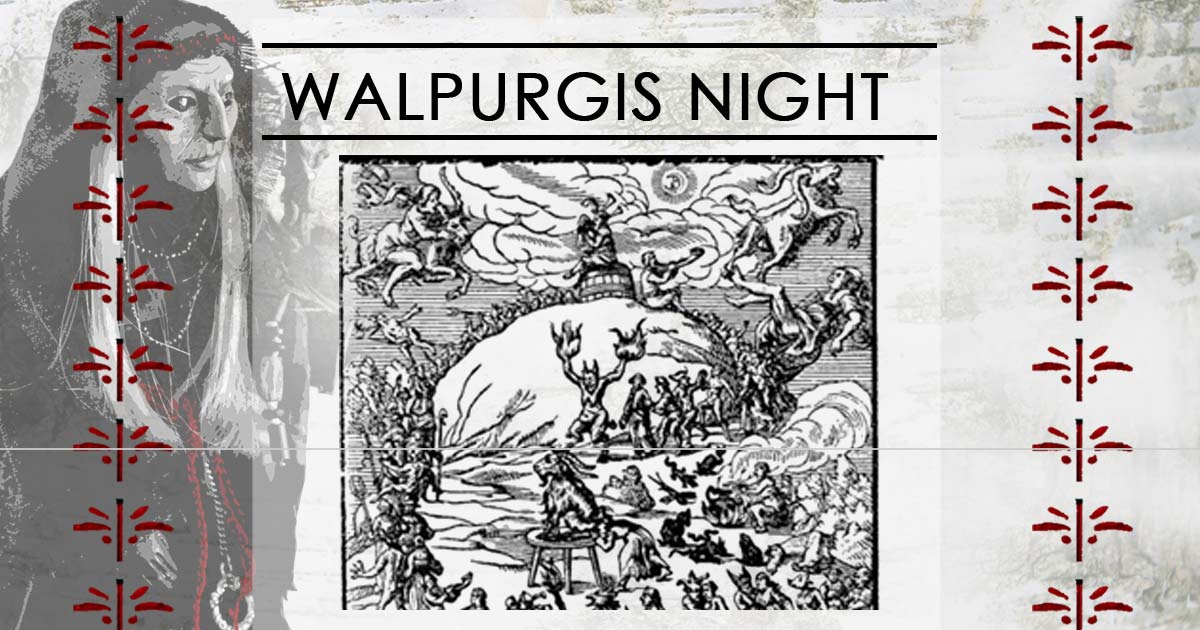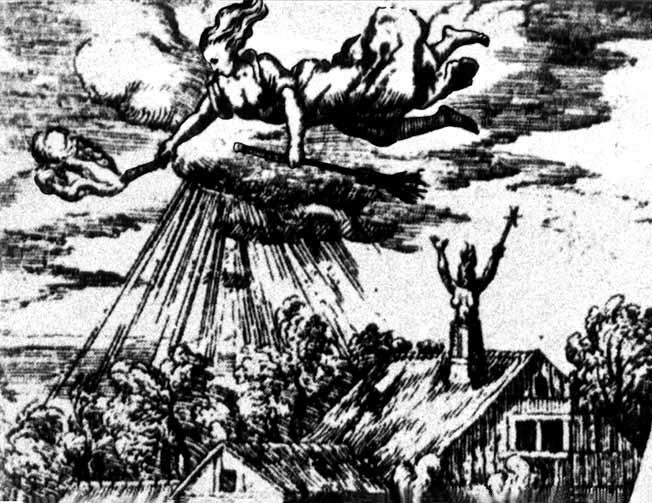
Johannes Praetorius – A German writer and historian shows in his work “Witches’ Sabbath” from 1688
In 1799 the German mason, member of the illuminati, natural scientist and first and foremost: poet Johann Wolfgang von Goethe wrote the ballad “Die erste Walpurgisnacht” – “The first Walpurgis night”.
In a sharp contrast to the Walpurgis night scene in Goethe’s Faust, which pretty much resembles the inquisitor’s cliche about the orgiastic meetings between witches and the devil on their Sabbath, the ballad “The first Walpurgis night” is different: It depicts a pagan community celebrating a spring festival according to the old ways, such as Beltane, despite being suppressed, criminalized and followed by the new, Christian majority.
In order to escape the prosecutors the pagans mask themselves with devil’s masks, exploiting the superstitious beliefs of their enemies. The plan works out and the druids finish their worship of May Day in peace, to celebrate the arrival of spring and the power of the sun.
Goethe – A Heathen?

Cover page of the ballad “Die erste Walpurgisnacht”. Written in 1799 and from the beginning intended to be set in music, the complex task would not be finished earlier than 1842. Ten years after Goethe’s death.
Goethe was sometimes called a heathen himself. However, in a different way: In a letter to Johann Caspar Lavater he once wrote that he would not be “an antichrist, neither an unchrist, but a decided non-christ”. In particular, he despited the symbolism of the cross, the original sin (which seemed to him an insult towards creation), and he opposed the Trinity as blasphemy against the one god, as scholar Werner Keller summarized.
He appreciated pantheistic views, in his art he fancied polytheism (especially of the classical antiquity), but his morals, still were Christian, as he used to underline.
Hence, despite Goethe’s inclination to masonry and occult topics – overall: his main work Faust is loosely based on rumors around the German Renaissance magician and cabalist Cornelius Agrippa von Nettesheim – he was no “heathen” in the way described in his poem “The first Walpurgis night”.
Meaning and Significance of Goethe’s “First Walpurgis night”
This raises the question what drove Goethe to his empathic poem (the text leaves no doubt on which’s side the poet stands!) about pagans celebrating spring and tricking and frightening their Christian persecutors with devil costumes and forks.
Goethe wrote from the very beginning the poem with the aim to have it set to music – a cantata for which he wanted his friend Carl Friedrich Zelter to be the composer. By sending a letter to Zelter, Goethe explained the background of his ballad:
A historian would have tried tracing back the origins of the ancient German belief in the devil’s or witches’ sabbath on the mountain Brocken, Harz (Germany). He found that the old pagan priests, after being driven out of their sacred groves, and after Christianity was made mandatory for the people, gathered with their true remaining followers in the hard accessible Harz mountains to celebrate the arrival of spring the old way.
In order to protect themselves from armed, but superstitious Christian prosecutors they would have covered up their faces with devil’s masks, to safely and unrecognized finish their “pure” worship.
Regardless of the historical accurateness, Goethe obviously liked this idea, and labels the Christian priests with their superstitions even as “dull”. His feelings are with the pagans, whose religion he depicts as supreme.
The Long Way to the Cantata
Composer Zelter, however, soon realized that this task was way beyond him. Instead, he arranged a meeting between Goethe and the 12 (!) year old Felix Mendelssohn-Bartholdy in 1821. The music was brilliant, but Goethe criticized the understanding of the text as “shallow”, thus the 12-year old could not transpose the complex layers of meaning Goethe had laid into his work. It would take 11 years until 1832 for Mendelssohn to finish the cantata. Goethe died in the same year. Whether he would have liked the result or not is unknown.
Mendelssohn himself felt the need to rework the cantata again, and the first performance was 10 years later: in 1842. Considered often a masterpiece, it took not less than 21 years to create it.
Three times seven – I am not an adept of music, and neither of Goethe, but there is magic in this music and seems the right soundtrack for a day like this 😉
Blessed Beltane, May Evening or Walpurgis night!
P.S. Do not miss Radiana’s post on the Witches’ Sabbath.
Felix Mendelssohn-Bartholdy: “Die erste Walpurgisnacht” Music and Video
Goethe: The First Walpurgis Night – German Text and English Translation
Es lacht der Mai – May is in full bloom
EIN DRUIDE
Es lacht der Mai!
Der Wald ist frei
Von Eis und Reifgehänge.
Der Schnee ist fort;
Am grünen Ort
Erschallen Lustgesänge.
Ein reiner Schnee
Liegt auf der Höh;
Doch eilen wir nach oben,
Begehn den alten heilgen Brauch,
Allvater dort zu loben.
Die Flamme lodre durch den Rauch!
So wird das Herz erhoben.
DIE DRUIDEN
Die Flamme lodre durch den Rauch!
Begeht den alten heilgen Brauch,
Allvater dort zu loben!
Hinauf! hinauf nach oben!
A DRUID
Sweet smiles the May!
The forest gay
From frost and ice is freed;
No snow is found,
Glad songs resound
Across the verdant mead.
Upon the height
The snow lies light,
Yet thither now we go,
There to extol our Father’s name,
Whom we for ages know.
Amid the smoke shall gleam the flame;
Thus pure the heart will grow.
THE DRUIDS
Amid the smoke shall gleam the flame;
Extol we now our Father’s name,
Whom we for ages know!
Up, up, then, let us go!
Könnt ihr so verwegen handeln? – Could you be so rash, so daring?
EINER AUS DEM VOLKE
Könnt ihr so verwegen handeln?
Wollt ihr denn zum Tode wandeln?
Kennet ihr nicht die Gesetze
Unsrer harten Überwinder?
Rings gestellt sind ihre Netze
Auf die Heiden, auf die Sünder.
Ach, sie schlachten auf dem Walle
Unsre Weiber, unsre Kinder.
Und wir alle
Nahen uns gewissem Falle.
CHOR DER WEIBER
Auf des Lagers hohem Walle
Schlachten sie schon unsre Kinder.
Ach, die strengen Überwinder!
Und wir alle
Nahen uns gewissem Falle.
ONE OF THE PEOPLE
Would ye, then, so rashly act?
Would ye instant death attract?
Know ye not the cruel threats
Of the victors we obey?
Round about are placed their nets
In the sinful heathen’s way.
Ah! upon the lofty wall
Wife and children slaughter they;
And we all
Hasten to a certain fall.
CHORUS OF WOMEN
Ay, upon the camp’s high wall
All our children loved they slay.
Ah, what cruel victors they!
And we all
Hasten to a certain fall.
Wer Opfer heut zu bringen scheut – Whoever fears to sacrifice
EIN DRUIDE
Wer Opfer heut
Zu bringen scheut,
Verdient erst seine Bande.
Der Wald ist frei!
Das Holz herbei,
Und schichtet es zum Brande!
Doch bleiben wir
Im Buschrevier
Am Tage noch im stillen,
Und Männer stellen wir zur Hut
Um eurer Sorge willen.
Dann aber laßt mit frischem Mut
Uns unsre Pflicht erfüllen.
A DRUID
Who fears to-day
His rites to pay,
Deserves his chains to wear.
The forest’s free!
This wood take we,
And straight a pile prepare!
Yet in the wood
To stay ’tis good
By day till all is still,
With watchers all around us placed
Protecting you from ill.
With courage fresh, then, let us haste
Our duties to fulfil.
Verteilt euch, wackre Männer, hier – Divide your forces, valiant men
CHOR DER WÄCHTER
Verteilt euch, wackre Männer, hier
Durch dieses ganze Waldrevier
Und wachet hier im stillen,
Wenn sie die Pflicht erfüllen.
CHORUS OF WATCHERS
Ye valiant watchers now divide
Your numbers through the forest wide,
And see that all is still.
While they their rites fulfil.
Diese dummen Pfaffenchristen – Christians and their priests are dull
EIN WÄCHETER
Diese dumpfen Pfaffenchristen,
Laßt uns keck sie überlisten!
Mit dem Teufel, den sie fabeln,
Wollen wir sie selbst erschrecken.
Kommt! Mit Zacken und mit Gabeln
Und mit Glut und Klapperstöcken
Lärmen wir bei nächtger Weile
Durch die engen Felsenstrecken.
Kauz und Eule
Heul in unser Rundgeheule!
A WATCHER
Let us in a cunning wise,
Yon dull Christian priests surprise!
With the devil of their talk
We’ll those very priests confound.
Come with prong and come with fork,
Raise a wild and rattling sound
Through the livelong night, and prowl
All the rocky passes round.
Screech-owl, owl,
Join in chorus with our howl!
Kommt mit Zacken und hit Gabeln – Come with prongs and pitchforks
CHOR DER WÄCHTER
Kommt mit Zacken und mit Gabeln,
Wie der Teufel, den sie fabeln,
Und mit wilden Klapperstöcken
Durch die leeren Felsenstrecken!
Kauz und Eule
Heul in unser Rundgeheule!
CHORUS OF WATCHERS
Come with prong, and come with fork,
Like the devil of their talk,
And with wildly ratthng sound,
Prowl the desert rocks around!
Screech-owl, owl,
Join in chorus with our howl!
So weit gebracht, dass wir bei Nacht – It’s come so far that now by night
EIN DRUIDE
So weit gebracht,
Daß wir bei Nacht
Allvater heimlich singen!
Doch ist es Tag,
Sobald man mag
Ein reines Herz dir bringen.
Du kannst zwar heut,
Und manche Zeit,
Dem Feinde viel erlauben.
Die Flamme reinigt sich vom Rauch:
So reinge unsern Glauben!
Und raubt man uns den alten Brauch,
Dein Licht, wer will es rauben?
A DRUID
Thus far ’tis right,
That we by night
Our Father’s praises sing;
Yet when ’tis day,
To Thee we may
A heart unsullied bring.
’Tis true that now.
And often, Thou
Favourest the foe in fight.
As from the smoke is freed the blaze,
So let our faith burn bright!
And if they crush our olden ways,
Who e’er can crush Thy light?
Hilf, ach hilf mir, Kriegsgeselle – Help, oh help me, comrade
EIN CHRISTLICHER WÄCHTER
Hilf, ach, hilf mir, Kriegsgeselle!
Ach, es kommt die ganze Hölle!
Sieh, wie die verhexten Leiber
Durch und durch von Flamme glühen
Menschen-Wölf und Drachen-Weiber.
Die im Flug vorüberziehen!
Welch entsetzliches Getöse!
Laßt uns, laßt uns alle fliehen!
Oben flammt und saust der Böse,
Aus dem Boden
Dampfet rings ein Höllen-Broden.
CHOR DER CHRISTLICHEN WÄCHTER
Schreckliche, verhexte Leiber,
Menschen-Wölf und Drachen-Weiber
Welch entsetzliches Getöse!
Sieh, da flammt, da zieht der Böse!
Aus dem Boden
Dampfet rings ein Höllen-Broden.
A CHRISTIAN WATCHER.
Comrades, quick! your aid afford!
All the brood of hell’s abroad:
See how their enchanted forms
Through and through with flames are glowing!
Dragon-women, men-wolf swarms,
On in quick succession going!
Let us, let us haste to fly!
Wilder yet the sounds are growing,
And the arch fiend roars on high;
From the ground
Hellish vapours rise around.
CHORUS OF CHRISTIAN WATCHERS.
Terrible enchanted forms,
Dragon-women, men-wolf swarms!
Wilder yet the sounds are growing!
See, the arch fiend comes, all-glowing!
From the ground
Hellish vapours rise around.
Die Flamme reinigt sich vom Rauch – The flame is purified from smoke
CHOR DER DRUIDEN
Die Flamme reinigt sich vom Rauch:
So reinge unsern Glauben!
Und raubt man uns den alten Brauch,
Dein Licht, wer kann es rauben!
CHORUS OF DRUIDS
As from the smoke is freed the blaze,
So let our faith burn bright!
And if they crush our olden ways,
Whoe’er can crush Thy light?

www.Nettlesgarden.com – The Old Craft




Mark A. O'Blazney | May 1, 2018
|
+
Lisa Allen MH of Timing Magic | May 2, 2019
|
Great post! I like the name of your site too, Nettle is one of my most favorite herbs I wildcraft! <3